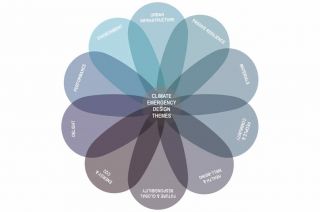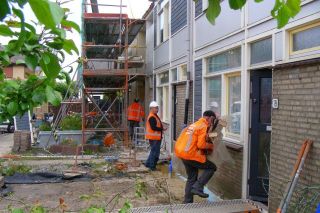
www.buildingsandcities.org/insights/commentaries/energy-data.html
Energy Data, Public Participation and the Green Transition

A societal conversation about the control and use of energy data is urgently needed to clarify rights and privileges surrounding the privacy, access and security of personal data.
Kirsten Gram-Hanssen and Maja de Neergaard (Aalborg University in Copenhagen) examine why so little public discussion exists on energy data and sustainable development. Detailed energy consumption data is a goldmine in terms of developing the climate-neutral society of the future. However, energy data reveal much about our private lives and the way we live in our homes.
Data is being collected about all of us all the time - tracking our web usage, our movement in the physical world, our shopping and our health. Concerns are emerging about how data can be misused and how large companies are exploiting data to make profits. So data deserves our attention and discussion. Data collection is also problematic because we do not fully understand how our data is used. What happens when we click "accept" before installing a new app on our mobile or visit a new website? As a citizen in a democratic society, it is important to know how our data is used, who it is sold to, what it reveals about us and how it changes the services provided to us.
Smart energy meters can collect data all the way down to a minute or hourly basis. In addition, it is becoming increasingly common to have smart control of the heat and of selected appliances. This can positively contribute to a green transition by matching energy demand with energy supply. Conversely, it can impact on energy consumption in our everyday lives: the patterns of how we use our homes to work, cook, bathe and watch TV, etc. In a future energy system that depends on renewable energy (where production and consumption must be aligned to account for generation, storage capacity and demand), can the knowledge from the collection of data help to manage our energy consumption? This implies ordinary consumers could have a much more active and important role in ensuring a sustainable society. Does that sound like a beautiful utopia? Or is it something that can only engage technical nerds? Or does it most of all represent a horror scenario about a surveillance society?
The visions and ideas about energy demand management raise further questions: Should citizens be perceived as individual consumers or as collective actors who join us in new energy communities? Should utilities manage energy without citizens even noticing or should inhabitants have control over it? These are important questions to answer that relate to democracy, transparency, participation and what type of society we want to live in. But regardless of which vision you subscribe to, data play an important part of the solution.
To address these questions, consider the three following examples. From the EU, there is talk of establishing energy communities, where we as private actors can come together to buy, sell and share energy. It may require new legislation and may require new technology development, which supports sharing locally. Much of the thinking is similar to the cooperatives that were significant players in the development of the electricity and district heating sectors in Denmark at the beginning of the last century. Another version is more private. Some people like the idea of energy self-sufficiency with solar cells on the roof or a household wind turbine (if you live in the country). Our research shows the majority of those who produce their own energy adapt their consumption to production either completely impractically or by using more technologically sophisticated solutions (Gram-Hanssen et al., 2020). The utilities, are interested to manage energy demand by inducing consumers to shift their consumption with different price signals or to directly control supply in private households (e.g. reduce peak loads by controlling when some appliances are used). All these are positive examples of a future sustainable society.
However, there could be other negative consequences. If it is necessary to shift everyday practices such as doing laundry and dishes for the sake of cost and environment, then research indicates that there may be a gender dimension in this (see e.g. Khalid et al., 2019). If a future involves a dictated set of times when to undertake some domestic chores, those undertaking these tasks (mostly women) will be adversely affected. Therefore, gender and the different ways men and women use technology and data needs to be taken into consideration for the development of the new systems (Mechlenborg and Gram-Hanssen, 2020).
Another example is 'energy poverty' as some people cannot afford to pay for the heat and energy that a normal everyday life requires, for heating, cooking, etc. The introduction of variable energy prices is likely to reflect the highly volatile spot market price of energy which will have a much greater impact on the price consumers pay. If very large differences in the price of electricity occur due to when it is used, then a key question is who will win and who will lose (Trotta et al., 2020). Some can afford to invest in smart technology and have the skills to be able to use it (Larsen and Gram-Hanssen, 2020). But this may penalize or exclude other people who cannot afford the technology and they may fall into an energy poverty trap.
The third example concerns how our energy data is shared. If individual or collective data on private consumption can be accessed and used by third parties to sell analysis, control and management services, then the question of who owns this data and for what purposes they can be traded and shared is extremely relevant to ask. One does not only have to be nervous about outsourcing essential knowledge about our privacy to large international companies. A few years ago, Denmark discussed the linking of data on the electricity consumption of the unemployed with data on the allocation of social benefits so that the state could detect benefit fraud (Fagbladet 3F, 2018).
To ensure an affordable green transition matching energy consumption and production is needed. Furthermore, consumers need to understand the way in which technically efficient solutions are designed. It is relatively easy to build a zero-energy house. The problem arises with its operation. Many examples exist of how consumers can easily obstruct the effective technology and (inadvertently) cause it not to work as intended. Smart ventilation systems and automatic sun protection in new buildings are well-known examples - part of the problem is a poor provision of information to inhabitants and a lack of post-occupancy evaluation (Gram-Hanssen et al., 2018). If the focus is only on efficient technology without inhabitant engagement, then consumption will not fall. Consumers are just developing new habits, making ever higher demands on comfort or bypassing the way automation was meant to work. But precisely because energy data is personal, we believe that it holds wider lessons about the use of digital data in many other areas. Initiating a societal conversation in democratic societies about the control and use of energy data is now urgently needed in order to provide clarity on rights and privileges surrounding the privacy, access and security of our data.
References
Fagbladet 3F. (2018). Dyneløfteri: Regeringen vil overvåge lediges elforbrug [WWW Document]. Fagbladet 3F. URL https://fagbladet3f.dk/artikel/regeringen-vil-overvaage-lediges-elforbrug (accessed 10.15.20).
Gram-Hanssen, K., Georg, S., Christiansen, E. & Heiselberg, P. (2018). What next for energy-related building regulations?: the occupancy phase. Building Research & Information. https://doi.org/10.1080/09613218.2018.1426810
Gram-Hanssen, K., Hansen, A.R. & Mechlenborg, M. (2020). Danish PV Prosumers' Time-Shifting of Energy-Consuming Everyday Practices. Sustainability 12, 4121. https://doi.org/10.3390/su12104121
Khalid, R., Christensen, T.H., Gram-Hanssen, K. & Friis, F. (2019). Time-shifting laundry practices in a smart grid perspective: a cross-cultural analysis of Pakistani and Danish middle-class households.Energy Efficiency. https://doi.org/10.1007/s12053-018-9769-7
Larsen, S.P.A.K. & Gram-Hanssen, K. (2020). When space heating becomes digitalized: Investigating competencies for controlling smart home technology in the energy-efficient home. Sustainability. 12. https://doi.org/10.3390/su12156031
Mechlenborg, M. & Gram-Hanssen, K. (2020). Gendered homes in theories of practice: A framework for research in residential energy consumption. Energy Research & Social. Sciences. 67, 1-9. https://doi.org/10.1016/j.erss.2020.101538
Trotta, G., Gram-Hanssen, K. & Jørgensen, P.L. (2020). Heterogeneity of Electricity Consumption Patterns in Vulnerable Households. Energies. https://doi.org/10.3390/en13184713
Latest Peer-Reviewed Journal Content
Urban verticalisation: typologies of high-rise development in Santiago
D Moreno-Alba, C Marmolejo-Duarte, M Vicuña del Río & C Aguirre-Núñez
A public theatre as a living lab to create resilience
A Apostu & M Drăghici
Reconstruction in post-war Rome: transnational flows and national identity
J Jiang
Reframing disaster recovery through spatial justice: an integrated framework
M A Gasseloğlu & J E Gonçalves
Tracking energy signatures of British homes from 2020 to 2025
C Hanmer, J Few, F Hollick, S Elam & T Oreszczyn
Spatial (in)justice shaping the home as a space of work
D Milián Bernal, J Laitinen, H Shevchenko, O Ivanova, S Pelsmakers & E Nisonen
Working at home: tactics to reappropriate the home
D Milián Bernal, S Pelsmakers, E Nisonen & J Vanhatalo
Living labs and building testing labs: enabling climate change adaptation
J Hugo & M Farhadian
Energy sufficiency, space temperature and public policy
J Morley
Living labs: a systematic review of success parameters and outcomes
J M Müller
Towards a universal framework for heat pump monitoring at scale
J Crawley, L Domoney, A O’Donovan, J Wingfield, C Dinu, O Kinnane, P O’Sullivan
Living knowledge labs: creating community and inclusive nature-based solutions
J L Fernández-Pacheco Sáez, I Rasskin-Gutman, N Martín-Bermúdez, A Pérez-Del-Campo
A living lab approach to co-designing climate adaptation strategies
M K Barati & S Bankaru-Swamy
Mediation roles and ecologies within resilience-focused urban living labs
N Antaki, D Petrescu, M Schalk, E Brandao, D Calciu & V Marin
Negotiating expertise in Nepal’s post-earthquake disaster reconstruction
K Rankin, M Suji, B Pandey, J Baniya, D V Hirslund, B Limbu, N Rawal & S Shneiderman
Designing for pro-environmental behaviour change: the aspiration–reality gap
J Simpson & J Uttley
Lifetimes of demolished buildings in US and European cities
J Berglund-Brown, I Dobie, J Hewitt, C De Wolf & J Ochsendorf
Expanding the framework of urban living labs using grassroots methods
T Ahmed, I Delsante & L Migliavacca
Youth engagement in urban living labs: tools, methods and pedagogies
N Charalambous, C Panayi, C Mady, T Augustinčić & D Berc
Co-creating urban transformation: a stakeholder analysis for Germany’s heat transition
P Heger, C Bieber, M Hendawy & A Shooshtari
Placemaking living lab: creating resilient social and spatial infrastructures
M Dodd, N Madabhushi & R Lees
Church pipe organs: historical tuning records as indoor environmental evidence
B Bingley, A Knight & Y Xing
A framework for 1.5°C-aligned GHG budgets in architecture
G Betti, I Spaar, D Bachmann, A Jerosch-Herold, E Kühner, R Yang, K Avhad & S Sinning
Net zero retrofit of the building stock [editorial]
D Godoy-Shimizu & P Steadman
Co-learning in living labs: nurturing civic agency and resilience
A Belfield
The importance of multi-roles and code-switching in living labs
H Noller & A Tarik
Researchers’ shifting roles in living labs for knowledge co-production
C-C Dobre & G Faldi
Increasing civic resilience in urban living labs: city authorities’ roles
E Alatalo, M Laine & M Kyrönviita
Co-curation as civic practice in community engagement
Z Li, M Sunikka-Blank, R Purohit & F Samuel
Preserving buildings: emission reductions from circular economy strategies in Austria
N Alaux, V Kulmer, J Vogel & A Passer
Urban living labs: relationality between institutions and local circularity
P Palo, M Adelfio, J Lundin & E Brandão
Living labs: epistemic modelling, temporariness and land value
J Clossick, T Khonsari & U Steven
Co-creating interventions to prevent mosquito-borne disease transmission in hospitals
O Sloan Wood, E Lupenza, D M Agnello, J B Knudsen, M Msellem, K L Schiøler & F Saleh
Circularity at the neighbourhood scale: co-creative living lab lessons
J Honsa, A Versele, T Van de Kerckhove & C Piccardo
Positive energy districts and energy communities: how living labs create value
E Malakhatka, O Shafqat, A Sandoff & L Thuvander
Built environment governance and professionalism: the end of laissez-faire (again)
S Foxell
Co-creating justice in housing energy transitions through energy living labs
D Ricci, C Leiwakabessy, S van Wieringen, P de Koning & T Konstantinou
HVAC characterisation of existing Canadian buildings for decarbonisation retrofit identification
J Adebisi & J J McArthur
Simulation and the building performance gap [editorial]
M Donn
Developing criteria for effective building-sector commitments in nationally determined contributions
P Graham, K McFarlane & M Taheri
Join Our Community

The most important part of any journal is our people – readers, authors, reviewers, editorial board members and editors. You are cordially invited to join our community by joining our mailing list. We send out occasional emails about the journal – calls for papers, special issues, events and more.
We will not share your email with third parties. Read more



Latest Commentaries
COP30 Report
Matti Kuittinen (Aalto University) reflects on his experience of attending the 2025 UN Conference of the Parties in Belém, Brazil. The roadmaps and commitments failed to deliver the objectives of the 2025 Paris Agreement. However, 2 countries - Japan and Senegal - announced they are creating roadmaps to decarbonise their buildings. An international group of government ministers put housing on the agenda - specifying the need for reduced carbon and energy use along with affordability, quality and climate resilience.
Building-Related Research: New Context, New Challenges
Raymond J. Cole (University of British Columbia) reflects on the key challenges raised in the 34 commissioned essays for Buildings & Cities 5th anniversary. Not only are key research issues identified, but the consequences of changing contexts for conducting research and tailoring its influence on society are highlighted as key areas of action.